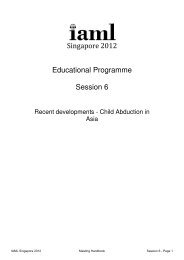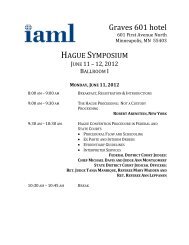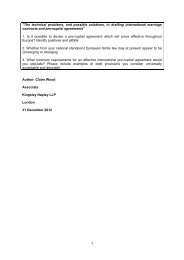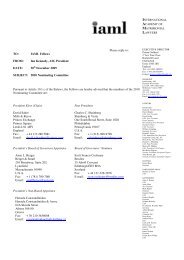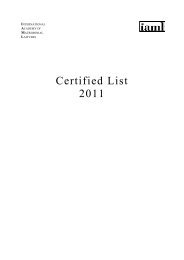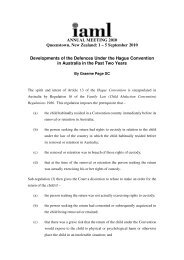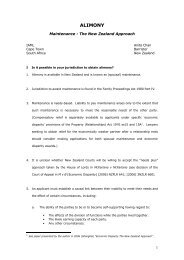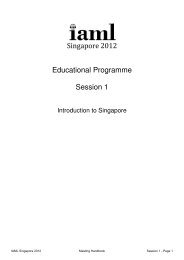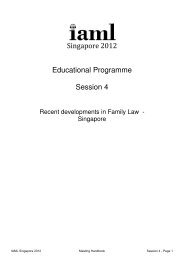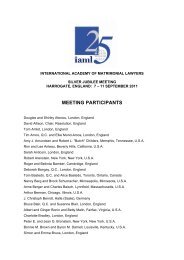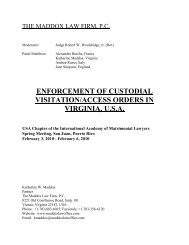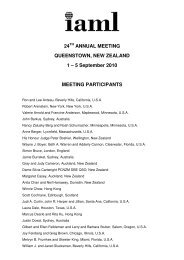Marriage Contracts and Prenuptial Agreements in French law ...
Marriage Contracts and Prenuptial Agreements in French law ...
Marriage Contracts and Prenuptial Agreements in French law ...
Create successful ePaper yourself
Turn your PDF publications into a flip-book with our unique Google optimized e-Paper software.
(3) where the spouses do not establish their first habitual residence after marriage <strong>in</strong> the same State.<br />
If the spouses do not have their habitual residence <strong>in</strong> the same State, nor have a common nationality, their<br />
matrimonial property regime is governed by the <strong>in</strong>ternal <strong>law</strong> of the State with which, tak<strong>in</strong>g all circumstances <strong>in</strong>to<br />
account, it is most closely connected.<br />
Article 5<br />
Any State may, not later than the moment of ratification, acceptance, approval or accession, make a declaration<br />
requir<strong>in</strong>g the application of its <strong>in</strong>ternal <strong>law</strong> accord<strong>in</strong>g to sub-paragraph 1 of the second paragraph of Article 4.<br />
This declaration shall not apply to spouses who both reta<strong>in</strong> their habitual residence <strong>in</strong> the State <strong>in</strong> which they have<br />
both had their habitual residence at the time of marriage for a period of not less than five years, unless that State is<br />
a Contract<strong>in</strong>g State which has made the declaration provided for <strong>in</strong> the first paragraph of this Article, or is a State<br />
which is not a Party to the Convention <strong>and</strong> whose rules of private <strong>in</strong>ternational <strong>law</strong> require the application of the<br />
national <strong>law</strong>.<br />
Article 6<br />
Dur<strong>in</strong>g marriage the spouses may subject their matrimonial property regime to an <strong>in</strong>ternal <strong>law</strong> other than that<br />
previously applicable.<br />
The spouses may designate only one of the follow<strong>in</strong>g <strong>law</strong>s –<br />
(1) the <strong>law</strong> of any State of which either spouse is a national at the time of designation;<br />
(2) the <strong>law</strong> of the State <strong>in</strong> which either spouse has his habitual residence at the time of designation.<br />
The <strong>law</strong> thus designated applies to the whole of their property.<br />
Nonetheless, the spouses, whether or not they have designated a <strong>law</strong> under the previous paragraphs or under<br />
Article 3, may designate with respect to all or some of the immovables, the <strong>law</strong> of the place where these<br />
immovables are situated. They may also provide that any immovables which may subsequently be acquired shall<br />
be governed by the <strong>law</strong> of the place where such immovables are situated.<br />
Article 7<br />
The <strong>law</strong> applicable under the Convention cont<strong>in</strong>ues to apply so long as the spouses have not designated a different<br />
applicable <strong>law</strong> <strong>and</strong> notwithst<strong>and</strong><strong>in</strong>g any change of their nationality or habitual residence.<br />
Nonetheless, if the spouses have neither designated the applicable <strong>law</strong> nor concluded a marriage contract, the<br />
<strong>in</strong>ternal <strong>law</strong> of the State <strong>in</strong> which they both have their habitual residence shall become applicable, <strong>in</strong> place of the<br />
<strong>law</strong> previously applicable –<br />
(1) when that habitual residence is established <strong>in</strong> that State, if the nationality of that State is their common<br />
nationality, or otherwise from the moment they become nationals of that State, or<br />
(2) when, after the marriage, that habitual residence has endured for a period of not less than ten years, or<br />
(3) when that habitual residence is established, <strong>in</strong> cases when the matrimonial property regime was subject to the<br />
<strong>law</strong> of the State of the common nationality solely by virtue of sub-paragraph 3 of the second paragraph of Article<br />
4.<br />
Article 8<br />
A change of applicable <strong>law</strong> pursuant to the second paragraph of Article 7 shall have effect only for the future, <strong>and</strong><br />
property belong<strong>in</strong>g to the spouses before the change is not subject to the new applicable <strong>law</strong>.<br />
Nonetheless, the spouses may at any time, employ<strong>in</strong>g the forms available under Article 13, subject the whole of<br />
their property to the new <strong>law</strong>, without prejudice, with respect to immovables, to the provisions of the fourth<br />
paragraph of Article 3 <strong>and</strong> the fourth paragraph of Article 6. The exercise of this option shall not adversely affect<br />
the rights of third parties.<br />
Article 9<br />
The effects of the matrimonial property regime on the legal relations between a spouse <strong>and</strong> a third party are<br />
governed by the <strong>law</strong> applicable to the matrimonial property regime <strong>in</strong> accordance with the Convention.



